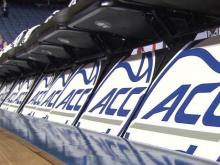NCAA athletes’ pay deal: Roy Williams says colleges are reacting rather than having a plan :: WRALSportsFan.com
Hall of Fame college basketball coach Roy Williams says the NCAA is simply reacting rather than having a plan to address last week’s settlement with players that opens the door for athletes to be paid.
“Right now what we’re doing is reacting to everything instead of making some plans in front. I always think those are bad situations,” Williams said in an interview during practice rounds for this weekend’s UNC Health Championship.
Williams is the honorary chairman of the tournament, a Korn Ferry Tour event, being held May 30 through June 2 at Raleigh Country Club.
Asked about the $2.8 billion settlement, which would allow for a revenue-sharing plan through which Division I athletes can be paid directly by their schools for playing sports, Williams said he’s happy for players.
“It’s a different game now. It’s a completely different era of college basketball and college sports. But it’s what it is. We’ve got to adjust,” he said.
Division 1 schools would be allowed to use about $20 million a year to pay their athletes as soon as the 2025 football season.
The lawsuit and settlement mark a sea change in the NCAA’s position that college athletes are amateurs, compensated for their play through the promise of an education.
Many questions remain about how universities would balance the financial burden of paying players.
Smaller conferences, such as the Big East — which includes Georgetown, Villanova and the University of Connecticut — have voiced “strong objections” to the settlement, worried about shouldering an unfair burden of costs involved in revenue sharing. They said schools that have higher-profile sports teams and are part of bigger conferences, which often have TV contracts and much higher revenues, should be responsible for covering more of the costs.

Even coaches at powerful athletic programs, such as the University of Florida, which is part of the Southeastern Conference, had qualms. Tim Walton, the school’s softball coach, wondered in an interview with The Associated Press what this would mean for smaller sports programs on campus, and how the university would handle sharing revenues with athletes.
Asked for his thoughts, Williams replied with his typical candor.
“I don’t have any thoughts because nobody has any thoughts,” he said. “It’s the biggest bunch of BS I’ve ever seen in my life.”
Critics of the settlement have also raised the question about how female athletes would be compensated. The settlement did not address how they would be paid compared with men, but Title IX prohibits sex-based discrimination in educational settings.
“Oftentimes, we put all of our eggs in the revenue-generating sports, which is comprised of mostly male sports,” said Jasher Cox, athletic director of Allen University, a historically Black and Division II school in South Carolina.
The settlement is only the latest in a series of big changes at the NCAA in recent years.
Nonetheless, Williams is certain he could handle the challenge if he wanted to.
“I could still coach today and take those kids out on the court and love what I was doing,” he said.
The New York Times contributed to this report.
Source: wralsportsfan.com